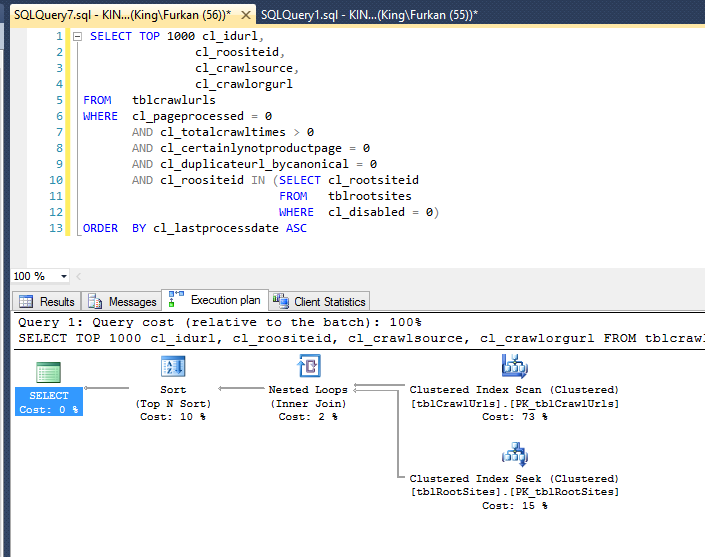Here are my full tables:
CREATE TABLE [dbo].[tblCrawlUrls](
[cl_IdUrl] [int] IDENTITY(1,1) NOT NULL,
[cl_CrawlNormalizedUrl] [nvarchar](200) NOT NULL,
[cl_RooSiteId] [smallint] NOT NULL,
[cl_ExploreDate] [datetime] NOT NULL CONSTRAINT [DF_tblCrawlUrls_cl_ExploreDate] DEFAULT (sysutcdatetime()),
[cl_LastCrawlDate] [datetime] NOT NULL CONSTRAINT [DF_tblCrawlUrls_cl_LastCrawlDate] DEFAULT ('2000-08-11 15:18:47.407'),
[cl_CrawlSource] [nvarchar](max) NOT NULL CONSTRAINT [DF_tblCrawlUrls_cl_CrawlSource] DEFAULT ('null'),
[cl_CrawlOrgUrl] [nvarchar](200) NOT NULL CONSTRAINT [DF_tblCrawlUrls_cl_CrawlOrgUrl] DEFAULT ('null'),
[cl_ExploredURL] [nvarchar](200) NOT NULL CONSTRAINT [DF_tblCrawlUrls_cl_ExploredURL] DEFAULT ('null'),
[cl_Ignored_By_Containing_Word] [bit] NOT NULL CONSTRAINT [DF_tblCrawlUrls_cl_Ignored_By_Containing_Word] DEFAULT ((0)),
[cl_CrawlFailedTimes] [int] NOT NULL CONSTRAINT [DF_tblCrawlUrls_cl_CrawlFailedTimes] DEFAULT ((0)),
[cl_TotalCrawlTimes] [int] NOT NULL CONSTRAINT [DF_tblCrawlUrls_cl_TotalCrawlTimes] DEFAULT ((0)),
[cl_UpdatedTimes] [int] NOT NULL CONSTRAINT [DF_tblCrawlUrls_cl_UpdatedTimes] DEFAULT ((0)),
[cl_DuplicateUrl_ByCanonical] [bit] NOT NULL CONSTRAINT [DF_tblCrawlUrls_cl_DuplicateUrl_ByCanonical] DEFAULT ((0)),
[cl_PageProcessed] [bit] NOT NULL CONSTRAINT [DF_tblCrawlUrls_cl_PageProcessed] DEFAULT ((0)),
[cl_LastProcessDate] [datetime] NOT NULL CONSTRAINT [DF_tblCrawlUrls_cl_LastProcessDate] DEFAULT ('2000-08-11 15:18:47.407'),
[cl_PossibleProductPage] [bit] NOT NULL CONSTRAINT [DF_tblCrawlUrls_cl_PossibleProductPage] DEFAULT ((0)),
[cl_CertainlyNotProductPage] [bit] NOT NULL CONSTRAINT [DF_tblCrawlUrls_cl_CertainlyNotProductPage] DEFAULT ((0)),
[cl_IsProductPage] [bit] NOT NULL CONSTRAINT [DF_tblCrawlUrls_cl_IsProductPage] DEFAULT ((0)),
[cl_Determined_Not_A_Product_Page] [bit] NOT NULL CONSTRAINT [DF_tblCrawlUrls_cl_NotProduct_Page] DEFAULT ((0)),
[cl_FreeCargo] [bit] NOT NULL CONSTRAINT [DF_tblCrawlUrls_cl_FreeCargo] DEFAULT ((0)),
[cl_ProductPrice_TL] [int] NOT NULL CONSTRAINT [DF_tblCrawlUrls_cl_ProductPrice] DEFAULT ((0)),
[cl_ProductCode] [nvarchar](200) NULL,
[cl_ProductImageLink] [nvarchar](200) NULL,
[cl_ProductIdCode] [nvarchar](200) NULL,
[cl_ProductCategoriesAsText] [nvarchar](200) NULL,
[cl_ProductDetailedExplanation] [nvarchar](max) NULL,
[cl_ProductFeatures_Wrapped] [nvarchar](max) NULL,
CONSTRAINT [PK_tblCrawlUrls] PRIMARY KEY CLUSTERED
(
[cl_IdUrl] ASC
)WITH (PAD_INDEX = OFF, STATISTICS_NORECOMPUTE = OFF, IGNORE_DUP_KEY = OFF, ALLOW_ROW_LOCKS = ON, ALLOW_PAGE_LOCKS = ON, FILLFACTOR = 85) ON [PRIMARY]
) ON [PRIMARY] TEXTIMAGE_ON [PRIMARY]
CREATE TABLE [dbo].[tblRootSites](
[cl_RootSiteId] [smallint] NOT NULL,
[cl_SiteRootUrl] [nvarchar](200) NOT NULL,
[cl_Disabled] [bit] NOT NULL CONSTRAINT [DF_tblRootSites_Disabled] DEFAULT ((0)),
[cl_AlexaRank_TR] [int] NOT NULL CONSTRAINT [DF_tblRootSites_cl_AlexaRank] DEFAULT ((0)),
[cl_RegisterTime] [datetime] NOT NULL CONSTRAINT [DF_tblRootSites_cl_RegisterTime] DEFAULT (sysutcdatetime()),
[cl_PriceDelimeter] [varchar](1) NOT NULL CONSTRAINT [DF_tblRootSites_cl_PriceDelimeter] DEFAULT ('.'),
[cl_PriceIgnoreDelimeter] [varchar](1) NOT NULL CONSTRAINT [DF_tblRootSites_cl_PriceIgnoreDelimeter] DEFAULT (','),
[cl_CertainProductPageDefiner] [nvarchar](200) NOT NULL CONSTRAINT [DF_tblRootSites_cl_CertainProductPageDefiner] DEFAULT ('null'),
[cl_ProductCategoryListing_Priority] [smallint] NOT NULL CONSTRAINT [DF_tblRootSites_cl_ProductCategoryListing_Priority] DEFAULT ((0)),
[cl_Ignore_Words_From_Category] [nvarchar](200) NOT NULL CONSTRAINT [DF_tblRootSites_cl_Ignore_From_Category] DEFAULT ('null'),
[cl_Ignore_Words_From_Urls] [nvarchar](200) NOT NULL CONSTRAINT [DF_tblRootSites_cl_Ignore_Urls_Parameters] DEFAULT ('null'),
[cl_Use_Last_Category_As_A_Product_Code] [bit] NOT NULL CONSTRAINT [DF_tblRootSites_cl_Use_Last_Category_As_A_Product_Code] DEFAULT ((0)),
[cl_Use_Custom_Character_Encoding] [int] NOT NULL CONSTRAINT [DF_tblRootSites_cl_Use_Custom_Character_Encoding] DEFAULT ((0)),
[cl_IgnorePages_Words] [nvarchar](200) NOT NULL CONSTRAINT [DF_tblRootSites_cl_IgnorePages_Words] DEFAULT ('null'),
[cl_IgnoreLastCategory] [bit] NOT NULL CONSTRAINT [DF_tblRootSites_cl_IgnoreLastCategory] DEFAULT ((0)),
CONSTRAINT [PK_tblRootSites] PRIMARY KEY CLUSTERED
(
[cl_RootSiteId] ASC
)WITH (PAD_INDEX = OFF, STATISTICS_NORECOMPUTE = OFF, IGNORE_DUP_KEY = OFF, ALLOW_ROW_LOCKS = ON, ALLOW_PAGE_LOCKS = ON, FILLFACTOR = 85) ON [PRIMARY]
) ON [PRIMARY]
Here is my SQL query:
SELECT TOP 1000 cl_idurl,
cl_roositeid,
cl_crawlsource,
cl_crawlorgurl
FROM tblcrawlurls
WHERE cl_pageprocessed = 0
AND cl_totalcrawltimes > 0
AND cl_certainlynotproductpage = 0
AND cl_duplicateurl_bycanonical = 0
AND cl_roositeid IN (SELECT cl_rootsiteid
FROM tblrootsites
WHERE cl_disabled = 0)
ORDER BY cl_lastprocessdate ASC
Here is the index which I assumed would be used, but it is not being used.
CREATE NONCLUSTERED INDEX [TCT-PP-LPD-CNPP-DUBC] ON [dbo].[tblCrawlUrls]
(
[cl_TotalCrawlTimes] ASC,
[cl_PageProcessed] ASC,
[cl_LastProcessDate] ASC,
[cl_CertainlyNotProductPage] ASC,
[cl_DuplicateUrl_ByCanonical] ASC
)
INCLUDE ( [cl_IdUrl],
[cl_RooSiteId],
[cl_CrawlOrgUrl]) WITH (PAD_INDEX = OFF, STATISTICS_NORECOMPUTE = OFF, SORT_IN_TEMPDB = OFF, DROP_EXISTING = OFF, ONLINE = OFF, ALLOW_ROW_LOCKS = ON, ALLOW_PAGE_LOCKS = ON, FILLFACTOR = 85)
In my query I use these as restrictions (in the where clause)
cl_pageprocessed
cl_totalcrawltimes
cl_certainlynotproductpage
cl_duplicateurl_bycanonical
I am assuming that using an index that includes these columns to determine possible primary key ids should be faster than total clustered index scan. But SQL Server is not doing that.
So my logic is not correct and that is what I want to learn. Why does SQL Server choose not to use my index? Not using my index means extra unnecessary load on my database and my hard drives.
Here is the execution plan:

